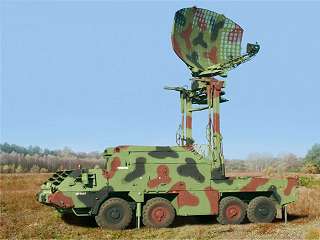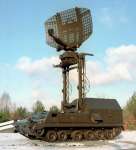N-21, N-22
Description of the radar set, tactical-technical characteristics

Figure 1: N-22
| Specifications | |
|---|---|
| frequency: | S-Band |
| pulse repetition time (PRT): | |
| pulse repetition frequency (PRF): | 1 000 Hz |
| pulsewidth (τ): | 10 µs |
| receive time: | |
| dead time: | |
| peak power: | 90 kW |
| average power: | |
| instrumented range: | 100 km |
| range resolution: | |
| accuracy: | 100 m; 0.2° |
| beamwidth: | |
| hits per scan: | |
| antenna rotation: | 12 or 24 rpm |
| MTBCF: | |
| MTTR: | |
N-21, N-22
The N-22 is an operating in S-Band self propelled short to midrange 2D- air surveillance radar for tactical use. It can also used as a gap filler up to an altitude of 7 000 m. The parabolic reflector of the antenna has the dimension of 4,2 × 3,1 m. It provides a cosecant-squared pattern. The predesessor of the N-22 was the N-21, using the same antenna. The N-21 used as transmitter power amplifier an amplitron, that was driven by a traveling wave tube of the type LO-301M. The N-22 radar is used to provide target information to low-level air defence systems such as the Russian 9K33 Osa (NATO SA-8 “Gecko”) self-propelled surface-to-air missile system. Prime contractor for the N-22 is the RADWAR company of Poland (now PITRADWAR). The radar is mounted on a modified Tatra 815 8×8 chassis and has a fully enclosed armoured cab in the centre and an elevatable mast at the rear.
The N-21 was produced since the late 1980s and the N-22 was produced since the mid-1990s.



